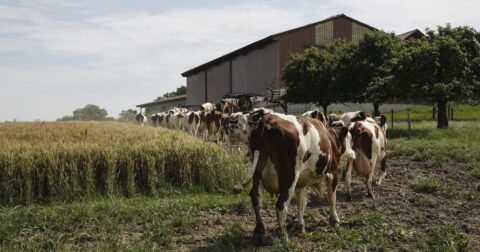Solutions
Shareholder Activists Push Fast Food Chains to Commit to Climate Targets
Climate•4 min read
Perspective
The last thing we needed was Big Oil and Big Ag on the same team. Now, they've joined forces in a dangerous attempt to greenwash the factory farming industry.


Words by Gene Baur
Big Oil and Big Ag are connected in their efforts to greenwash unsustainable practices as we saw last week with Chevron announcing its partnership with industrial dairies to produce and market biomethane, and now BP is planning to sell renewable gas derived from poultry litter. It’s encouraging to see a growing awareness about the need to address the climate crisis, but we need to beware of misleading proposals that sound good on the surface while deceiving the public and perpetuating destructive practices. Agribusiness has a long history of “farming the government” and profiting at taxpayer expense, and they continue lobbying for public support to construct biogas digesters at factory farms, with the bogus promise that they will lower greenhouse gasses (GHG) by converting animal excrement into energy. A far better approach is to prevent the accumulation of factory farm waste in the first place and to require that environmental polluters be held accountable for the damage they cause.
The GHG emissions from farm animals’ manure are significant, but only comprise one-tenth of the emissions from animal agriculture. Forty-five percent are generated to produce feed for farm animals and another 39 percent emanate from the animals’ enteric digestion. Focusing on the false solution of biogas digesters distracts from addressing more effective responses to the climate crisis. We can shift millions of acres of land to help sequester GHG instead of denuding it to grow corn and soy monocrops with petrochemical fertilizers and biocides to feed billions of animals who are crowded in factory farm warehouses. We can sustain and nourish more people with less land and fewer resources by eating crops directly, instead of feeding them to farm animals.
Confined Animal Feeding Operations (CAFOs) are ecological disasters notorious for spewing toxic waste and emitting noxious gasses that exacerbate the climate crisis. These industrial operations are poisoning the land, water, and air, harming communities, and sickening neighbors who are disproportionately people of color. Huge cesspools of excrement, which the industry euphemistically calls “lagoons,” have become legal and public relations problems, but instead of taking responsibility, the industry wants public support to help clean up its messes, such as with biogas digesters.
Government programs have subsidized and enabled irresponsible factory farming practices for decades. As a result, animals and citizens, including farmers, and the environment have suffered while agribusiness has externalized costs and built equity by extracting billions of dollars in public assistance. Crop insurance and other programs that encourage the excessive production of feedstuffs for farm animals as well as supports for manure management, including with biogas digesters, should be shifted to help smaller farms that produce fruits, vegetables, and other healthy foods that our nation needs to eat more of. Public resources should serve the public good instead of encouraging industrial animal agriculture and continued corporate consolidation.
Family farms across the U.S. are being forced out of business by large-scale operations, which cynically exploit the sad stories of struggling and disenfranchised farmers to lobby for increased government funding, and that support goes mainly to factory farms. A similar Orwellian scheme is playing out with biodigesters, wherein well-meaning citizens and policymakers are being sold policies that deepen the problem they’re hoping to solve. Instead of perpetuating and entrenching our costly and inefficient factory farm system, it is time for fundamental reforms.
Any meaningful effort at reducing GHG emissions and other ecological threats will require a phase-out of industrialized animal agriculture. Producing animal foods currently takes 83 percent of the earth’s farmland but provides only 18 percent of our calories. In the U.S., ten times more land is used for animal farming than to grow food for human consumption. Federal, state, and local programs should promote a transition toward a more diversified and sustainable food system that produces healthy plant-based foods and meaningful opportunities for family-scale farms.
As conscientious consumers, we can each play a role by eating less or no meat, but we also need to advance public policies that serve the common good and help protect our planet. One of the first and most obvious things policymakers should do is to reject and stop funding factory farming, including their biodigesters.